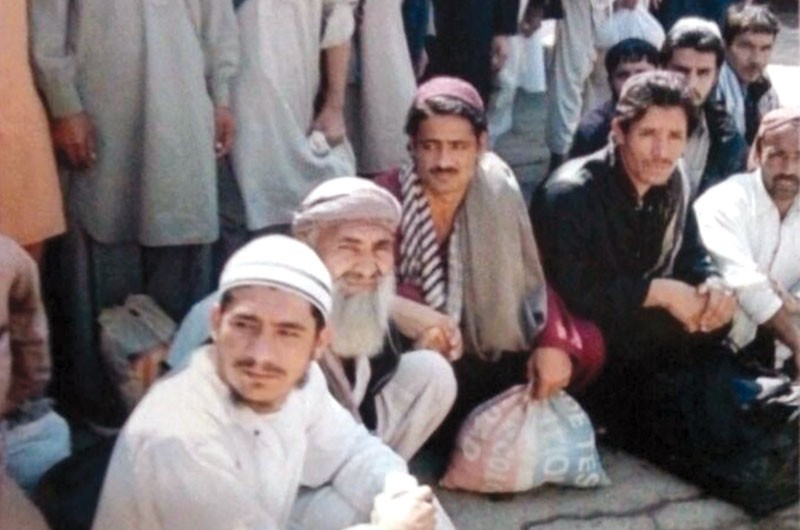
Narrating the untold stories of Pakistani prisoners in Afghan jails and Afghan prisoners in Pakistani jails

Since the past several years, Haji Sohrab, a representative of Afghan refugees in Karachi, has been actively seeking release of Afghan prisoners from various jails in Sindh province.
Most of these prisoners are ones who were arrested by the local police under Foreign Registration Act (FRA) for travelling without visa documents. With the assistance of Afghan Consulate in Karachi and Sindh Home Department, the jail administrations release Afghan prisoners for deportation. Sohrab takes them to the Chaman border where he hands them over to Afghan authorities.
Sohrab does not remember the actual number of Afghan prisoners released in recent years. "But in the last four months, 387 prisoners have been released from various jails of Sindh after completion of their sentences and handed over to Afghan authorities at the Chaman border," he tells TNS. "By and large, Pakistani authorities are very supportive in releasing the Afghan prisoners."
On the contrary, the situation in Afghanistan is very different. There the local courts jail Pakistani nationals travelling without visa documents for several years -- in many cases accusing them of spying, TNS learnt in its recent visit to Kabul.
It is a routine for labourers world over to cross borders, sometimes illegally in search of better wages. Because the value of Afghan currency is higher than the Pakistani rupee, there are many employment opportunities in the construction and other sectors in Afghanistan. A number of Pakistani nationals travel to different parts of Afghanistan -- Kabul in particular -- both legally and illegally for work purposes. Afghanistan’s law enforcement agencies treat Pakistanis in their country with mistrust -- this is why they charge the Pakistanis who are travelling without visa documents with espionage.
Wali Gul, 58, a resident of Swabi district of Khyber Pakhtunkwha, has been visiting Kabul after every two or three months for the release of his son Tarifullah, 22, who was arrested by the Afghan law enforcement agencies in Arzan Qeemat area of Kabul in March 2013.
Tarifullah, a jobless youth, entered Afghanistan illegally as a construction worker (daily wager) in Kabul. "Pakistani nationals enter Afghanistan illegally for work, health and other purposes. Tarifullah thought he would not face any problem in Afghanistan," Gul tells TNS in Kabul. "But he was not aware of the Afghan authorities’ hostile attitude towards Pakistanis."
A local Afghan court jailed Tarifullah for 22 years in prison, accusing him of espionage. "Local lawyers are not ready to fight his son’s case because of spying charges. Even we are not allowed to meet him," says Gul, adding that in the beginning, his son was kept in Pul-e-Charkhi jails and, a year ago, was moved to Bagram jail. The International Committee for the Red Cross (ICRC) has been arranging Skype calls to talk with Tarifullah.
Background interviews with Pakistani diplomats and professionals in Kabul suggest that the actual number of Pakistani prisoners in Afghanistan’s jails is not known because of several reasons. Pakistani diplomats say one of the key reasons is non-cooperative attitude of Afghan authorities towards Pakistan. "Afghan authorities don’t allow Pakistani diplomats to share information regarding Pakistani prisoners nor do they allow meeting them in jails," says a diplomat in Kabul.
According to Pakistani diplomatic sources, there are 163 Pakistani prisoners in different jails of Afghanistan, 50 and 56 among them are in Bagram and Pul-e-Charkhi jails respectively while 32 are in Afghan National Army-run detention centre in Parawan and 23 in the detention centre of the National Directorate of Security (NDS), Afghanistan’s spy agency.
On Feb 7, Afghan security forces arrested five Pakistani doctors; two of them were women, in Baharak and Kesham district of Badakhshan province, alleging that they were spying for Pakistan, Tolo News reports.
Ansar Burney, a leading Pakistani human rights activist, who has been working for the release of prisoners in various countries, says millions of Afghan refugees openly roam in Pakistan, do businesses, but Pakistani authorities are comparatively not as harsh towards them.
"We are not demanding the release of prisoners who are actually involved in any sort of terrorism but to strengthen ties between the two countries, Ghani should release Pakistani workers arrested under false charges of espionage," says Burney. He also demands the United States and other rights group to pressure Afghan government to release such Pakistani prisoners on humanitarian grounds.
Shariq Hussain, a Pakistani accountant working with an international firm in Kabul, says harassment of Pakistani professionals and workers by Afghan authorities is very common but they experience a rise in it after any terrorist attack in Afghanistan. "It is similar to Afghan refugees who face such a situation in Pakistan but the behaviour of Afghan government and even the society is very hostile towards us," he says.
Relatives of the Pakistani prisoners want the Government of Pakistan to take up the release of prisoners in their talks with Afghan government. Gul says Pakistani Pashtun nationalist parties, including Asfandyar Wali, Mehmood Khan Achakzai and Afrasyab Khattak, regularly visit Afghansitan and meet their leaders in Islamabad. "They should play their role in the release of Tarifullah and other prisoners."